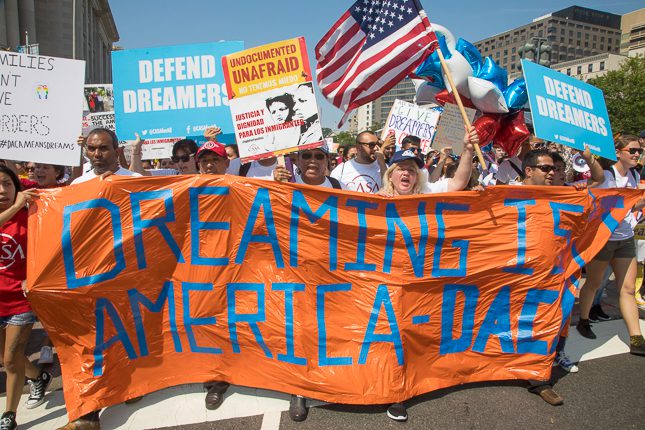DREAMers’ Fate Hangs on Congress, Trump, SCOTUS
By • February 15, 2018 0 575

On Feb. 8, Congress passed and President Donald Trump signed a two-year, $4.4-trillion budget after weeks of contention and two brief government shutdowns. The budget only became law because congressional leaders promised to debate this week how the illegal immigrants often referred to as DACA DREAMers might be given legal status.
The DREAMers (named for the Development, Relief, and Education for Alien Minors Act, proposed but not enacted) came to the U.S. before the age of 16, have been here five years or more and are under the age of 30. They number between 2 and 4 million, depending on what definition is used. They could have come in legally or illegally, with parents or alone, through a legal port of entry or over a wall. They must have graduated from high school or earned a GED.
DACA recipients are the 690,000 DREAMers who applied individually for the Deferred Action for Childhood Arrivals program created by President Barack Obama’s executive memo of June 2012. While DACA did not give legal status, it did defer deportation temporarily (for two years, with a two-year extension) and provided recipients with a temporary work permit. President Trump rescinded Obama’s executive memo as of March 5, 2018. All protections will begin to end after that date.
President Trump has laid out four “pillars” of immigration reform — the basics of any bill that he declares he would sign. They are: permanent legal status to 1.8 million DREAMers, the securing of the southern border with a wall and other elements and the end of two programs of the 1965 Immigration and Nationality Act: family unification/chain migration and the “diversity” lottery visa program.
As of Thursday morning, Feb. 15, there were four Republican proposals — officially amendments to a shell bill H.R. 2579 (don’t ask) circulating around the Senate. They range from more or less parroting the president’s four pillars to pushing broad immigration reform and legalizing the parents of DREAMers.
All the Senate proposals would offer permanent legal status (the green card) leading to citizenship after five years to the DREAMers. Only one would offer it to their parents.
A bill by the Common Sense Coalition — a group of eight Republicans, seven Democrats and one Independent led by moderates Susan Collins (R-Maine) and Joe Manchin (D-West Virginia), probably is the most serious contender. That’s because it is bipartisan and because that coalition was the force behind passage of the budget.
It would legalize 1.8 million DREAMers, including the 700,000 DACA recipients, with an eventual five-year (at least) pathway to citizenship. It would budget $25 billion for a wall during a 10-year period via a kind of trust fund arrangement that could be changed.
It offers a limited family reunification program: that is, DREAMers who became citizens could not sponsor their parents for permanent or temporary visas but other green-card holders can. And it doesn’t end the annual 50,000 green cards in the diversity lottery visa program — although talk of replacing diversity qualifications for merit-based immigrants could still be on the table later.
All of this is contentious. But the bill would only need three more Republican votes to pass.
Would it pass the House? Could be that Speaker Paul Ryan (R-Wisconsin), who is sympathetic to an expanded legalization program for DREAMers, could whip it. But possibly at risk to his speakership (which may be moot if he decides not to run).
If it passes Congress, would President Trump then sign it or veto it? To date, he claims he will veto anything that does not contain at least his four pillars. But no one knows what he will really do.
The urgent deadline of March 5 may be changing. On Tuesday evening, Feb. 13, U.S. District Judge Nicholas Garaufis in Brooklyn ruled that the president could not end DACA as he did. He ordered a halt to the deadline date. If DACA doesn’t end on March 5, the Democrats’ time leverage would be greatly reduced. Republicans could decide to hold off the decision.
There are risks for both parties in prolonging the discussion for too long. But they may be forced to wait. The Supreme Court will likely take up the constitutional matter of the president’s actions. And then the fate of the DACA recipients and DREAMers will be in the hands of SCOTUS.

